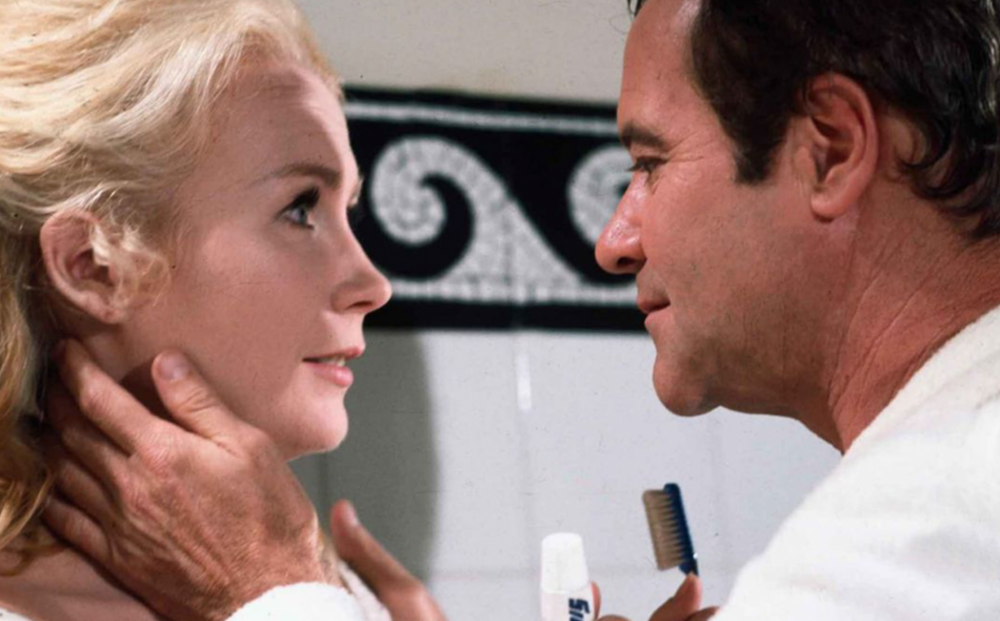“Billy Wilder is too cynical to believe even his own cynicism,” the film critic Andrew Sarris opined in his book The American Cinema, in which he infamously labeled Wilder to the slum-like category, “Less Than Meets the Eye.” A Jewish-Polish émigré who fled Hitler and spent his Hollywood career tearing into every popular authority figure, be it European or American, Wilder’s reputation has outlasted Sarris’s disapproval, even though most viewers still consider him a cynic. Those only familiar with his iconic ‘40s and ‘50s work, however, will be surprised to find that by the time of his late career masterpiece, Avanti! (1972), something had softened in Wilder. Avanti! is the rare Wilder film that believes in uncomplicated romance, joie de vivre, and sincere optimism. But, that doesn’t mean it's not filled with cruel physical humor, noxious ethnic stereotypes, broad satires of American entitlement, and a central Jack Lemmon performance that sees him at his most snarly, tantrum-prone, and pathetic. It’s a Wilder film after all.
As Wendell Ambruster Jr., the well-off son of a notable industrialist, Lemmon forgoes much of the dopey everyman schtick that made even a wheedling sycophant like C.C. Baxter in The Apartment (1960) into an endearing do-gooder. Stuck on the Italian island of Ischia, where bureaucracy and gangsterism have held up his mission to retrieve his father’s corpse, Ambruster spends much of the movie complaining to and about everyone in sight. Besides the myriad stock Italians who form much of the film’s humor, the main recipient of Ambruster’s nagging is Pamela Piggott (Juliet Mills), the daughter of his father’s deceased mistress. Working class, despairing over her weight, and appreciative of their parent’s flagrant sexuality and love affair, Piggott is a classic romantic foil to Ambruster’s neurotic all-business-all-the-time obnoxiousness. That they are destined to repeat their parents’ romance is inevitable. That it all happens at a relaxed clip, filled with screwball antics and sparkling conversation over languorous meals, is the film’s charm.
Alongside flagrant cynicism, Wilder’s second-greatest reputational legend has long been the sign that sat above his desk, asking the simple, inspirational question: “How would Lubitsch do it?” Avanti! is the closest Wilder ever got to answering that question. Beyond the surface-level signs of the Lubitschian—the jaunty European setting, explicit obsession with sex, genial lightness—one of Avanti!’s greatest achievements is its capacity for unending visual wit. It’s evident throughout, from the nearly dialogue-less opening, to the tourist-like views of Ischia, which manage to paint both a grotesque portrait of Italy and one that conveys a romantic attitude of epicurean discovery. Ambruster, who goes from being a buttoned-up tight-ass who doesn’t drink Italian coffee to enjoying leisurely mornings in bed and lavish meals, has echoes of those Lubitschian upper-crust characters who discover their sensuality whether they want to or not.
While Avanti! was derided upon release for being too long and vulgar, it's precisely the film’s indulgent sense of pacing, and how it takes joy in details, that make it such an enjoyable experience. As Piggott tells Ambruster early in the film, in Italian “avanti” means forward, approach, or even enter. In the context of the film, it becomes a symbol of Ambruster’s gradual opening up toward the possibility of an idle love affair with Piggott. In the context of Wilder’s career, it signifies an opening onto a certain youthful energy that only re–emerged through old age.
Avanti! screens this afternoon, May 18, and on May 20 and May 23, at Film Forum on 35mm as part of the series “Jack Lemmon 100.” A post-screening conversation between Mills and Film Forum Artistic Repertory Director Bruce Goldstein will take place this evening.



